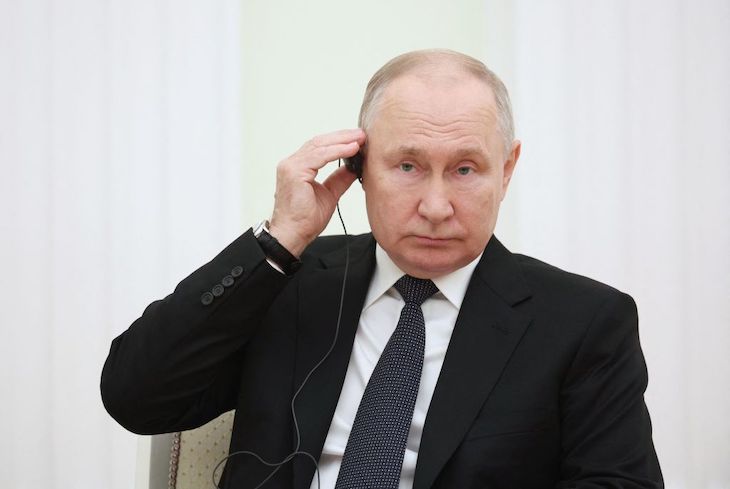Inevitably, some have tried to suggest the terrorist invasion of Israel was in some ways orchestrated by Moscow. ‘Russia is interested in igniting a war in the Middle East so that a new source of pain and suffering will weaken world unity,’ said Ukraine’s president Volodymyr Zelensky in the aftermath of the attack. But if Russia was involved, why has its response been so weak and uncertain? In fact, the Kremlin seems near-paralysed by the unfolding conflict.
Of course, Moscow hopes that this crisis will distract the West from Ukraine and undermine its ability to continue to fuel its war effort. It is also trying to spin useful narratives, such as the unproven assertion that Western weapons donated to Ukraine have turned up in the hands of Hamas. However, despite counter-claims that Wagner mercenaries trained the terrorists, there is no evidence that Moscow played any role, despite its continuing willingness to talk to Hamas. Rather, it was clearly caught unawares, with no sense of where its interests lay.
As Israel mobilised and declared itself in a state of war, Moscow belatedly fell back on old and dated platitudes. On Monday, two days after the initial attack, Kremlin press spokesman, Dmitry Peskov, finally said that Russia was ‘extremely concerned’ at the risk of ‘further escalation and expansion of the conflict.’ Only on Tuesday did Vladimir Putin say anything, but even then, it was essentially to try and blame Washington, calling this a ‘vivid example of the failure of United States policy in the Middle East’ in which the U.S. ‘was not concerned with finding compromises acceptable to both sides, but, on the contrary, promoted its own ideas about how it should be done and put both sides under pressure.’
For all his macho public persona, Putin does not take tough decisions easily or quickly
Foreign minister Sergei Lavrov, meeting the head of the Arab League, Ahmed Aboul Gheit, said that creating a ‘Palestinian state that would live side by side with Israel’ was the most reliable path to any resolution. Former prime minister Dmitry Medvedev, staying depressingly true to recent form as the most rabidly tone-deaf voice in the government, turned to social media to blame ‘Washington and its allies,’ saying that ‘instead of actively working to resolve the Palestine-Israeli [conflict], these idiots have picked a fight with us and are helping neo-Nazis with might and main’.
Even though there are Russian citizens (or joint citizens) among the dead and kidnapped, there was no condemnation of the horrific outrages carried out by Hamas on civilians. Yet nor was there any real enthusiasm for the Palestinians’ attacks. Instead, as one Foreign Office official put it, there seemed to be ‘intense awkwardness’ as Moscow tried to ‘respond without actually saying anything.’ Instead, it is falling back on the blandest of bromides, offering nothing of meaning to anyone.
Moscow benefits from a certain level of chaos and uncertainty in the Middle East to give it some leverage, but a conflagration like this, which poses very real strategic challenges, is a very different matter.
Russia has developed a quietly close relationship with Israel. Putin and Israeli prime minister Benjamin Netanyahu have found considerable common ground. Ironically, there is also much admiration for Israel and its military and intelligence agencies amongst Russian nationalists, who often hold it up as an example. At the same time, Moscow has maintained relations with Palestinian movements, and also has a pragmatic but strengthening connection with their real backers, Iran, which has become a crucial source of drones and sanctions-busting know-how.
For all his macho public persona, Putin does not take tough decisions easily or quickly, and when he is faced with what seem to be no good options, he often becomes paralysed. This seems to be the case here. If he backs Hamas, he alienates Israel, a country that until now has held back from arming Ukraine. He would also, in effect, become an extra in Iran’s power play. Iran is not so much an ally, let alone a friend, as a frenemy of convenience. They share a common interest in undermining the Western-dominated world order, but they are also competitors for influence in the Middle East. Putin hardly wants to burn his relationship with Israel just to further Iranian ambitions.
On the other hand, if he backs Israel, he angers Iran, and potentially jeopardises one of Russia’s few partnerships these days, as well as losing influence in the Arab world. With Saudi Arabia’s Crown Prince Mohammed bin Salman on the one hand working on normalising relations with Israel and yet on the other cooperating with Moscow through OPEC+ to manage the global oil market, Lavrov is desperately trying also to triangulate where they fit. The Saudis continue to pay lip service to the Palestinians’ cause, but have shown little enthusiasm to back Hamas, and also see Iran as their main regional foe.
Whatever the inanities to be found on campus or at the political fringes, Western governments generally found themselves in the unusual position of finding morality and geopolitics in alignment, and could condemn the terrorism and pledge their support for Israel without qualification or hesitation.
For Putin, by contrast, the situation is much more complex. Russia has backed Assad in Syria but switched off its air defence systems when the Israelis wanted to bomb the Palestinian militias who were also fighting on Damascus’s side. It has worked closely with Iran against the sanctions regime, yet cosied up to Saudi Arabia and tried to sell weapons to Iraq. Above all, it has presented itself as a friend to the Arab world – even using wayward Chechen warlord Ramzan Kadyrov as an informal ambassador – while cultivating Israel.
For so long, Putin has tried to have his cake and eat it. Now, he seems to be choking on it.







Comments